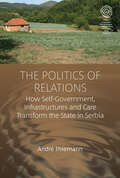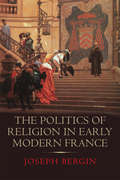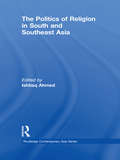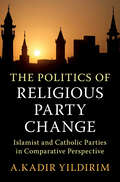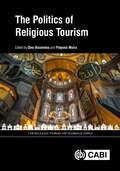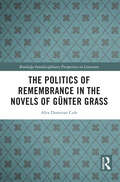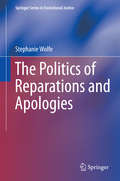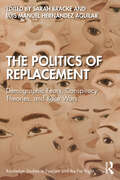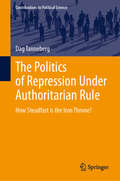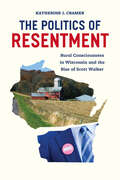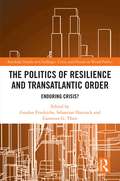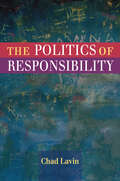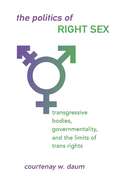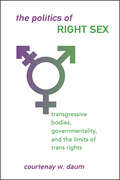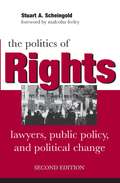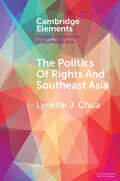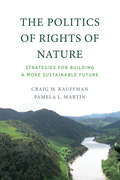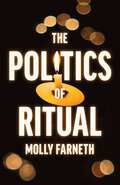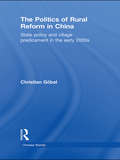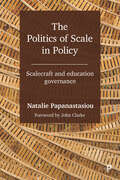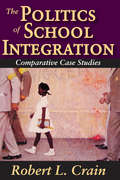- Table View
- List View
The Politics of Relations: How Self-Government, Infrastructures, and Care Transform the State in Serbia (EASA Series #49)
by André ThiemannRethinking the contributions of the Manchester School of Social Anthropology for political ethnography, the Politics of Relations elaborates its relational approach to the state along four interlaced axes of research – embeddedness, boundary work, modalities and strategic selectivity – that enable thick comparisons across spatio-temporal scales of power. In Serbia local experiences of self-government, infrastructure and care motivate its citizens to “become the state” while cursing it heartily. While both officials and citizens strive for a state that enables a “normal life,” they navigate the increasingly illiberal politics enacted by national parties and which are tolerated by trans-national donors.
The Politics of Religion in Early Modern France
by Joseph BerginRich in detail and broad in scope, this majestic book is the first to reveal the interaction of politics and religion in France during the crucial years of the long seventeenth century. Joseph Bergin begins with the Wars of Religion, which proved to be longer and more violent in France than elsewhere in Europe and left a legacy of unresolved tensions between church and state with serious repercussions for each. He then draws together a series of unresolved problems#151;both practical and ideological#151;that challenged French leaders thereafter, arriving at an original and comprehensive view of the close interrelations between the political and spiritual spheres of the time. The author considers the powerful religious dimension of French royal power even in the seventeenth century, the shift from reluctant toleration of a Protestant minority to increasing aversion, conflicts over the independence of the Catholic church and the power of the pope over secular rulers, and a wealth of other interconnected topics.
The Politics of Religion in South and Southeast Asia (Routledge Contemporary Asia Series)
by Ishtiaq AhmedThe notion of a ‘politics of religion’ refers to the increasing role that religion plays in the politics of the contemporary world. This book presents comparative country case studies on the politics of religion in South and South Asia, including India, Pakistan and Indonesia. The politics of religion calls into question the relevance of modernist notions of secularism and democracy, with the emphasis instead on going back to indigenous roots in search of authentic ideologies and models of state and nation building. Within the context of the individual countries, chapters focus on the consequences that politics of religion has on inclusive nation-building, democracy and the rights of individuals, minorities and women. The book makes a contribution to both the theoretical and conceptual literature on the politics of religion as well as shed light on the implications and ramifications of the politics of religion on contemporary South Asian and South East Asian countries. It is of interest to students and scholars of South and South East Asian Studies, as well as Comparative Politics.
The Politics of Religious Party Change: Islamist and Catholic Parties in Comparative Perspective (Cambridge Studies in Social Theory, Religion and Politics)
by A. Kadir YildirimThe Politics of Religious Party Change examines the ideological change and secularization of religious political parties and asks: when and why do religious parties become less anti-system? In a comparative analysis, the book traces the striking similarities in the historical origins of Islamist and Catholic parties in the Middle East and Western Europe, chronicles their conflicts with existing religious authorities, and analyzes the subsequently divergent trajectories of Islamist and Catholic parties. In examining how religious institutional structures affect the actions of religious parties in electoral politics, the book finds that centralized and hierarchical religious authority structures - such as the Vatican - incentivize religious parties to move in more pro-system, secular, and democratic directions. By contrast, less centralized religious authority structures - such as in Sunni Islam - create more permissive environments for religious parties to be anti-system and more prone to freely-formed parties and hybrid party movements.
The Politics of Religious Tourism (CABI Religious Tourism and Pilgrimage Series)
by Dr Daniel H Olsen Associate Professor Anna Trono Valentina Castronuovo Xosé M. Santos Charlotte Lee Dr Elisa Piva Stefania Cerutti Dane Munro Dimitrios Mylonopoulos Panagiota Manoli Silvia Aulet Serrallonga Masahiro Omae Maria Angelica Orozco Jorge Olleros-Rodriguez Spyridon Parthenis Francisco SingulAddressing a dearth of literature in this area, this book provides a comprehensive overview and framework of study of the politics of religious tourism. Existing work shows awareness that politics is present but the approach has been one of benign neglect, and/or a priori assumptions about the role of politics in the management of sacred sites. Previous literature is fragmented into various perspectives and approaches that best serve different disciplinary interests. By understanding the politics of religious tourism through the various perspectives and approaches from the discipline of political science, law, public policy, and other fields, this book: · Focuses on how power is exercised regarding religious tourism. · Looks at the governing institutions of religious tourism including the role of relevant governmental bodies such as ministries of tourism or national tourism boards, ministries of religion and/or culture. · Covers the role and influence of religious governing institutions, such as state-supported church/mosque officials, and universities. This book will be of great interest to researchers and students of religious tourism, pilgrimage, as well as related subjects such as political science, economics, sociology, tourism, law studies, and religious studies.
The Politics of Remembrance in the Novels of Günter Grass (Routledge Interdisciplinary Perspectives on Literature)
by Alex Donovan ColeThis manuscript argues for the importance of Günter Grass as a political thinker in addition to his status as a novelist and public intellectual, capable of forming ethical responses to contemporary issues like neoliberalism and place of the petit bourgeoisie in social life. I define Grass’s trajectory as a thinker through his novels and speeches. Primarily, I draw attention to the role memory plays in Grass’s thought: that his work represented an intellectual and aesthetic response to the role Nazism continued to play in West German politics in the post war era. To Grass, Nazism represented a resurgent threat unaddressed following the end of World War II. Later, Grass amended his concept of memory politics to address neoliberal capitalism, reiterating his radicalism and affirming the need for German society to resist the rise of extreme ideologies.
The Politics of Reparations and Apologies
by Stephanie Wolfe The Politics of Reparations and Apologies examines the evolution and dynamics of reparation politics and justice. The volume introduces the key concepts, theories, and terms associated with social movements and in particular, the redress and reparation movement (RRM). Drawing from RRMs that have their foundation in World War II--the German genocides, the United States internments, and the Japanese "comfort women" system-- the volume explores each case study's relative success or failure in achieving its goals and argues that there are overarching trends that can explain success and failure more generally in the RRM movement. Using the backdrop of international criminal law and normative concepts of reparations, the volume establishes and analyzes the roles of reparations and apologies in obtaining transitional justice. In each case study, there is a detailed rundown of the political actions that were attempted to obtain redress and reparation for the victims, of how successful the attempts were, and of the crucial factors which influenced the relative success or failure. Crucially, the volume offers a comparative framework of the actions that contribute to a successful outcome for transitional justice. With the increasing normative expectation of justice in post-conflict situations, this volume is a valuable resource for researchers in international affairs, human rights, political science, and conflict studies.
The Politics of Replacement: Demographic Fears, Conspiracy Theories, and Race Wars (Routledge Studies in Fascism and the Far Right)
by Sarah Bracke Luis Manuel Hernández AguilarThe Politics of Replacement explores current demographic conspiracy theories and their entanglement with different forms of racism and exclusionary politics such as sexism. The book focuses on population replacement conspiracy theories, i.e. those imaginaries and discourses centered on the idea that the national population is under threat of being overtaken or even wiped out by those considered as “alien” to the nation, and that this is the result of concerted efforts by “elites”. Replacement conspiracy theories are on the rise again: from Eurabia fantasies to Renaud Camus’ The Great Replacement, white supremacist discourses are thriving and increasingly broadcasting in mainstream venues. To account for their rise and spread, this edited volume brings together research on various dimensions of population replacement conspiracy theories: different theoretical and methodological approaches, different social scientific and humanities (inter)disciplinary backgrounds, different geographical case-studies (across Europe, North America, Southeast Asia, and Oceania), different time-periods (medieval archives, colonial archives, Nazi archives, post-colonial migrations, post-9/11), and different forms of racialization and racisms (Islamophobia, antisemitism, racism against migrants and refugees), as well as with the entanglement of population replacement discourse with gendered violence. The book is organized into four sections: (1) exploring the historical background of the current rise of demographic conspiracy theories; (2) tracing the (neoliberal) governmentalities in and through which replacement discourse operates; (3) analysing the particularly intense focus on the threat of Muslims in contemporary replacement conspiracy theories, and (4) investigating the connection between replacement conspiracies, gender, and violence. This title is essential reading for scholars, journalists, and activists interested in the contemporary far right, conspiracy theories, and racisms.
The Politics of Representation in the Global Age
by Peter A. Hall Peter A. Hall Wade Jacoby Jonah Levy Sophie Meunier Wade Jacoby Jonah LevyHow has the process of political representation changed in the era of globalization? The representation of interests is at the heart of democracy, but how is it that some interests secure a strong voice, while others do not? While each person has multiple interests linked to different dimensions of his or her identity, much of the existing academic literature assumes that interests are given prior to politics by a person's socioeconomic, institutional, or cultural situation. This book mounts a radical challenge to this view, arguing that interests are actively forged through processes of politics. The book develops an analytic framework for understanding how representation takes place - based on processes of identification, mobilization, and adjudication - and explores how these processes have evolved over time. Through a wide variety of case studies, the chapters explore how actors identify their interests, mobilize them into action, and resolve conflicts among them.
The Politics of Repression Under Authoritarian Rule: How Steadfast is the Iron Throne? (Contributions to Political Science)
by Dag TannebergDoes authoritarian rule benefit from political repression? This book claims that it does, if restrictions and violence, two fundamentally different forms of repression, complement each other. Based on an in-depth quantitative analysis of the post-Second World War period, the author draws three central conclusions. Firstly, restrictions and violence offer different advantages, suffer from different drawbacks, and matter differently for identical problems of authoritarian rule. Secondly, empirical data supports complementarity only as long as political repression preempts political opposition. Lastly, despite its conceptual centrality, political repression has little influence on the outcomes of authoritarian politics. The book also offers new insights into questions such as whether repression hinders successful political campaigns or whether it is more likely to trigger coups d’état.
The Politics of Resentment: A Genealogy
by Jeremy EngelsIn the days and weeks following the tragic 2011 shooting of nineteen Arizonans, including congresswoman Gabrielle Giffords, there were a number of public discussions about the role that rhetoric might have played in this horrific event. In question was the use of violent and hateful rhetoric that has come to dominate American political discourse on television, on the radio, and at the podium. A number of more recent school shootings have given this debate a renewed sense of urgency, as have the continued use of violent metaphors in public address and the dishonorable state of America’s partisan gridlock. This conversation, unfortunately, has been complicated by a collective cultural numbness to violence. But that does not mean that fruitful conversations should not continue. In The Politics of Resentment, Jeremy Engels picks up this thread, examining the costs of violent political rhetoric for our society and the future of democracy.The Politics of Resentment traces the rise of especially violent rhetoric in American public discourse by investigating key events in American history. Engels analyzes how resentful rhetoric has long been used by public figures in order to achieve political ends. He goes on to show how a more devastating form of resentment started in the 1960s, dividing Americans on issues of structural inequalities and foreign policy. He discusses, for example, the rhetorical and political contexts that have made the mobilization of groups such as Nixon’s “silent majority” and the present Tea Party possible. Now, in an age of recession and sequestration, many Americans believe that they have been given a raw deal and experience feelings of injustice in reaction to events beyond individual control. With The Politics of Resentment, Engels wants to make these feelings of victimhood politically productive by challenging the toxic rhetoric that takes us there, by defusing it, and by enabling citizens to have the kinds of conversations we need to have in order to fight for life, liberty, and equality.
The Politics of Resentment: A Genealogy
by Jeremy EngelsIn the days and weeks following the tragic 2011 shooting of nineteen Arizonans, including congresswoman Gabrielle Giffords, there were a number of public discussions about the role that rhetoric might have played in this horrific event. In question was the use of violent and hateful rhetoric that has come to dominate American political discourse on television, on the radio, and at the podium. A number of more recent school shootings have given this debate a renewed sense of urgency, as have the continued use of violent metaphors in public address and the dishonorable state of America’s partisan gridlock. This conversation, unfortunately, has been complicated by a collective cultural numbness to violence. But that does not mean that fruitful conversations should not continue. In The Politics of Resentment, Jeremy Engels picks up this thread, examining the costs of violent political rhetoric for our society and the future of democracy.The Politics of Resentment traces the rise of especially violent rhetoric in American public discourse by investigating key events in American history. Engels analyzes how resentful rhetoric has long been used by public figures in order to achieve political ends. He goes on to show how a more devastating form of resentment started in the 1960s, dividing Americans on issues of structural inequalities and foreign policy. He discusses, for example, the rhetorical and political contexts that have made the mobilization of groups such as Nixon’s “silent majority” and the present Tea Party possible. Now, in an age of recession and sequestration, many Americans believe that they have been given a raw deal and experience feelings of injustice in reaction to events beyond individual control. With The Politics of Resentment, Engels wants to make these feelings of victimhood politically productive by challenging the toxic rhetoric that takes us there, by defusing it, and by enabling citizens to have the kinds of conversations we need to have in order to fight for life, liberty, and equality.
The Politics of Resentment: Rural Consciousness in Wisconsin and the Rise of Scott Walker (Chicago Studies in American Politics)
by Katherine J. CramerSince the election of Scott Walker, Wisconsin has been seen as ground zero for debates about the appropriate role of government in the wake of the Great Recession. In a time of rising inequality, Walker not only survived a bitterly contested recall that brought thousands of protesters to Capitol Square, he was subsequently reelected. How could this happen? How is it that the very people who stand to benefit from strong government services not only vote against the candidates who support those services but are vehemently against the very idea of big government? With The Politics of Resentment, Katherine J. Cramer uncovers an oft-overlooked piece of the puzzle: rural political consciousness and the resentment of the "liberal elite." Rural voters are distrustful that politicians will respect the distinct values of their communities and allocate a fair share of resources. What can look like disagreements about basic political principles are therefore actually rooted in something even more fundamental: who we are as people and how closely a candidate's social identity matches our own. Using Scott Walker and Wisconsin's prominent and protracted debate about the appropriate role of government, Cramer illuminates the contours of rural consciousness, showing how place-based identities profoundly influence how people understand politics, regardless of whether urban politicians and their supporters really do shortchange or look down on those living in the country. The Politics of Resentment shows that rural resentment--no less than partisanship, race, or class--plays a major role in dividing America against itself.
The Politics of Resilience and Transatlantic Order: Enduring Crisis? (Routledge Studies on Challenges, Crises and Dissent in World Politics)
by Sebastian Harnisch Gordon Friedrichs Cameron G. ThiesThis edited volume bridges the "analytical divide" between studies of transatlantic relations, democratic peace theory, and foreign policy analysis, and improves our theoretical understanding of the logic of crises prevention and resolution. The recent rise of populism and polarization in both the U.S.A and Europe adds to a host of foreign policy crises that have emerged in transatlantic relations over the last two decades. Through examining how democracies can manage to sustain and maintain mechanisms of crisis resilience that are embedded in the democratic peace, and particularly transatlantic relations, this book helps enhance the understanding of inter-democratic crisis resolution across issue areas. In doing so, it addresses some of the most important and prevalent crises of our time, such as anti-terrorism intervention in Afghanistan; Iran’s nuclear program; burden-sharing within North Atlantic Treaty Organization NATO; key aspects of the international order, such as binding norms for cyber security and the integration of China into the Western-led international economic order; as well as domestic order shifts, such as the British vote to leave the European Union (EU) and the impact of the Trump administration populist foreign policy on transatlantic crisis resolution. This book will be of key interest to students and scholars of International Relations, Transatlantic Studies, Foreign Policy Analysis, and Comparative Politics.
The Politics of Responsibility
by Chad LavinPolitics cannot function without responsibility, but there have been serious disagreements about how responsibility is to be understood and huge controversies about how it is to be distributed, rewarded, legislated, and enforced. The liberal notions of personal responsibility that have dominated political thinking in the West for more than a century are rooted in the familiar territory of individual will and causal blame, but these theories have been assailed as no longer adequate to explain or address the political demands of a global social structure. Informed by Marx, Foucault, and Butler, Chad Lavin argues for a "postliberal" theory of responsibility, formulating responsibility as a process that is anchored in a persistent ability to respond, not reproach. Lavin works this formulation through discussions of contemporary political issues such as globalization, police brutality, and abortion. Rather than assigning individual blame, postliberal responsibility challenges the supposed autonomy of individual subjects by taking structural arguments into account. Lavin concludes that a liberal concept of responsibility gives rise to a moralistic and oppressive approach to social problems, while a postliberal approach highlights a shared responsibility for developing collective solutions to systemic problems. Postliberal responsibility not only suggests more generous and democratic responses to social ills, it also allows us to theorize a greater range of issues that demand political response.
The Politics of Right Sex: Transgressive Bodies, Governmentality, and the Limits of Trans Rights
by Courtenay DaumExamines the limitations of rights-based mobilization and litigation for advancing the interests of trans individuals in the contemporary United States. <p><p> While the growing attention to trans rights and the development of trans-specific interest groups suggest that the time is right for a trans rights movement akin to prior civil rights movements, The Politics of Right Sex explores the limitations of rights-based mobilization and litigation for advancing the interests of trans communities. Synthesizing critical theory, transgender studies, and extant law and society research, Courtenay W. Daum argues that trans individuals, particularly those situated at the intersection of gender, race, class, and immigration status, are regulated by myriad forces of governmentality that work to maintain the sex and gender binaries and associated power hierarchies. Because many informal practices and norms are located beyond the reach of civil rights laws, a trans politics of rights may produce some modest legal and legislative reforms but will not eliminate the disciplinary forces that work to subject trans individuals. It will also privilege those who are able to conform with dominant gender norms at the expense of the interests of those individuals who are gender nonconforming, gender queer, trans people of color, and others unable or unwilling to embrace a transnormative presentation of self and/or lifestyle. In order to disrupt the dominant discourse and hierarchical power arrangements in pursuit of collective liberation for all as opposed to rights for some, The Politics of Right Sex advocates for a more confrontational approach that directly engages and challenges the hegemonic power structures that govern and discipline trans individuals.
The Politics of Right Sex: Transgressive Bodies, Governmentality, and the Limits of Trans Rights (SUNY series in Queer Politics and Cultures)
by Courtenay W. DaumWhile the growing attention to trans rights and the development of trans-specific interest groups suggest that the time is right for a trans rights movement akin to prior civil rights movements, The Politics of Right Sex explores the limitations of rights-based mobilization and litigation for advancing the interests of trans communities. Synthesizing critical theory, transgender studies, and extant law and society research, Courtenay W. Daum argues that trans individuals, particularly those situated at the intersection of gender, race, class, and immigration status, are regulated by myriad forces of governmentality that work to maintain the sex and gender binaries and associated power hierarchies. Because many informal practices and norms are located beyond the reach of civil rights laws, a trans politics of rights may produce some modest legal and legislative reforms but will not eliminate the disciplinary forces that work to subject trans individuals. It will also privilege those who are able to conform with dominant gender norms at the expense of the interests of those individuals who are gender nonconforming, gender queer, trans people of color, and others unable or unwilling to embrace a transnormative presentation of self and/or lifestyle. In order to disrupt the dominant discourse and hierarchical power arrangements in pursuit of collective liberation for all as opposed to rights for some, The Politics of Right Sex advocates for a more confrontational approach that directly engages and challenges the hegemonic power structures that govern and discipline trans individuals.
The Politics of Rights
by Stuart A. ScheingoldStuart A. Scheingold's landmark work introduced a new understanding of the contribution of rights to progressive social movements, and thirty years later it still stands as a pioneering and provocative work, bridging political science and sociolegal studies. In the preface to this new edition, the author provides a cogent analysis of the burgeoning scholarship that has been built on the foundations laid in his original volume. A new foreword from Malcolm Feeley of Berkeley's Boalt Hall School of Law traces the intellectual roots of The Politics of Rights to the classic texts of social theory and sociolegal studies.
The Politics of Rights and Southeast Asia (Elements in Politics and Society in Southeast Asia)
by Lynette J. ChuaWhat do rights mean in Southeast Asia? How do differently situated individuals, social groups, and institutions, make sense of and deploy concepts of rights? How do their concepts relate to religious beliefs, norms, and practices that underpin social hierarchy and relations, as well as experiences with and memories of political conflict and post-colonial developments? What are the consequences of asserting rights? This Element takes a 'politics of rights' approach. The approach treats rights not merely as substantive or normative meanings found in international law, regional instruments and domestic constitutional documents, but as political processes: Rights come to life through ongoing series of social interactions. The approach in this Element helps readers understand the often contradictory findings about rights in a manner sensible to political subjectivities and helps readers make sense of why rights are sometimes helpful to Southeast Asians who appeal to them, sometimes disappointing, and often paradoxically both.
The Politics of Rights of Nature: Strategies for Building a More Sustainable Future
by Pamela L. Martin Craig M. KauffmanHow Rights of Nature laws are transforming governance to address environmental crises through more ecologically sustainable approaches to development. With the window of opportunity to take meaningful action on climate change and mass extinction closing, a growing number of communities, organizations, and governments around the world are calling for Rights of Nature (RoN) to be legally recognized. RoN advocates are creating new laws that recognize natural ecosystems as subjects with inherent rights, and appealing to courts to protect those rights. Going beyond theory and philosophy, in this book Craig Kauffman and Pamela Martin analyze the politics behind the creation and implementation of these laws, as well as the effects of the laws on the politics of sustainable development. Kauffman and Martin tell how community activists, lawyers, judges, scientists, government leaders, and ordinary citizens have formed a global movement to advance RoN as a solution to the environmental crises facing the planet. They compare successful and failed attempts to implement RoN at various levels of government in six countries--Bolivia, Colombia, Ecuador, India, New Zealand, and the United States--asking why these laws emerged and proliferated in the mid-2000s, why they construct RoN differently, and why some efforts at implementation are more successful than others. As they analyze efforts to use RoN as a tool for constructing more ecocentric sustainable development, capable of achieving the 2030 Agenda for Sustainable Development goal of living "in harmony with Nature," Kauffman and Martin show how RoN jurisprudence evolves through experimentation and reshapes the debates surrounding sustainable development.
The Politics of Ritual
by Molly FarnethAn illuminating look at the transformative role that rituals play in our political livesThe Politics of Ritual is a major new account of the political power of rituals. In this incisive and wide-ranging book, Molly Farneth argues that rituals are social practices in which people create, maintain, and transform themselves and their societies. Far from mere scripts or mechanical routines, rituals are dynamic activities bound up in processes of continuity and change. Emphasizing the significance of rituals in democratic engagement, Farneth shows how people adapt their rituals to redraw the boundaries of their communities, reallocate goods and power within them, and cultivate the habits of citizenship.Transforming our understanding of rituals and their vital role in the political conflicts and social movements of our time, The Politics of Ritual examines a broad range of rituals enacted to just and democratic ends, including border Eucharists, candlelight vigils, and rituals of mourning. This timely book makes a persuasive case for an innovative democratic ritual life that can enable people to create and sustain communities that are more just, inclusive, and participatory than those in which they find themselves.
The Politics of Rural Reform in China: State Policy and Village Predicament in the Early 2000s (Chinese Worlds)
by Christian GöbelBased on a treasure trove of information collected through fieldwork interviews and painstaking documentary research through the Chinese and Western language presses, this book analyzes one of the most important reforms implemented in China over the past decade – the rural tax and fee reform, also known as the "Third Revolution in the Countryside". The aim of the tax was to improve social stability in rural China, which has become increasingly shaken by peasant protests, many of them large-scale and violent. By examining the gap between the intentions of the reform and the eventual outcomes, Göbel provides new insights into the nature of intergovernmental relations in China and highlights the ways in which the relationship between the state and the rural populace has fundamentally changed forever. The Politics of Rural Reform in China will appeal to students and scholars of Chinese politics, governance and development studies.
The Politics of Scale in Policy: Scalecraft and Education Governance
by Natalie PapanastasiouSucceeding in the art of contemporary policymaking involves designing policies which reflect the deeply interconnected nature of political space. And yet, policy continues to be articulated through age-old categories and hierarchies of scale. This book asks why scale occupies this enduring position of privilege in policymaking, highlighting how scales are far from ‘natural’ features of policy and that they are instead essential to the armoury of policy practice. Drawing on empirical data from the field of education governance, the book traces how scales are crafted and mobilised in policymaking practices, demonstrating that ‘scalecraft’ is key to understanding the production of hegemony.
The Politics of School Integration: Comparative Case Studies
by Robert CrainThis book discusses desegregation as a community decision, focusing on case studies from the 1960s. Crain uses comparative techniques based on fifteen northern and southern cities. The author seeks a "total" explanation for the decision to desegregate by determining its proximate causes and locating the roots of the decision in the economic, social, and political structure of the community. This work represents the first attempt to conduct a genuinely scientific analysis of the political process by which school systems were desegregated in this period.Robert L. Crain documents the way in which eight non-southern, big-city school systems met community demands to reduce segregation. Reactions varied from immediate compliance to months and years of stubborn resistance, some cities maintaining good relations with civil rights leaders and others becoming battlegrounds. Differences in these reactions are explained and focus is brought to desegregation in the South New Orleans in particular. The situation there is contrasted with six peacefully desegregated southern cities as well as the attitude of its powerful economic elite. The concluding part of the book is a general consideration of the civil rights movement in the cities studied, and the author considers the implications of his findings, both for the future of school desegregation and for studies of community politics.Employing comparative techniques and concentrating upon the outputs of political systems, this is a highly innovative contribution to the study of community power structures and their relationship to educational systems. It remains an effective supplement to courses in sociology, political science, and education, as well as an important source of data for everyone concerned with the history of efforts for national integration.
The Politics of Scientific Advice
by Justus Lentsch Peter WeingartControversies over issues such as genetically engineered food, foot-and-mouth disease and the failure of risk models in the global financial crisis have raised concerns about the quality of expert scientific advice. The legitimacy of experts, and of the political decision-makers and policy-makers whom they advise, essentially depends on the quality of the advice. But what does quality mean in this context, and how can it be achieved? This volume argues that the quality of scientific advice can be ensured by an appropriate institutional design of advisory organisations. Using examples from a wide range of international case studies, including think tanks, governmental research institutes, agencies and academies, the authors provide a systematic guide to the major problems and pitfalls encountered in scientific advice and the means by which organisations around the world have solved these problems.
